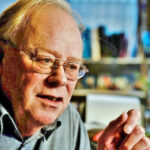Andrew Revkin, tot voor kort klimaatredacteur bij The New York Times, heeft een zeer interessant bericht vandaag op zijn blog Dot Earth over hoe het nu verder moet met het IPCC. Hij interviewde daar voor- en tegenstanders van het IPCC voor.
Opvallend is dat vrijwel iedereen het erover eens is dat er veranderingen moeten komen, ook de pro-IPCC onderzoeker Michael Oppenheimer:
“I.P.C.C. is a continuously evolving, complex and ultimately extremely important process which is already vastly more transparent and more accountable than it was at the time of its first assessment, 20 years ago. It is also more transparent and accountable than any other scientific assessment process I know of. In fact, given the close scrutiny I.P.C.C. reports are subject to after publication, the rarity of such episodes speaks well for the I.P.C.C. process. But the stakes are high and one failure like this is one too many. We can and should do better.”
Ik ben het absoluut niet met hem eens dat het IPCC-proces transparanter is en ‘verantwoordelijker’ dan welk ander wetenschappelijk assessment proces maar het is een stap vooruit dat hij erkent dat het nog beter moet.
Eerlijke makelaar
Ook Pielke jr, die de laatste tijd veelvuldig kritiek heeft geuit op het IPCC en diens voorzitter en ook op het Stern-rapport (zie hier, hier, hier en hier) komt aan het woord. Hij doet twee aanbevelingen:
1. If I.P.C.C. is to be the most credible scientific body then it needs to have the highest standards for dealing with conflicts of interest and bias — presently it has none. Such standards were discussed in a Bipartisan Policy Commission Report that I helped write last year for how the Obama Administration could improve its scientific advisory processes. The guidelines are appropriate in I.P.C.C. context as well. In short, disclosure, transparency, criteria for conflicts of interest and explicit mechanisms for dealing with conflicts and bias.
2. The I.P.C.C. needs to clarify its role in providing advice (what advice? to whom?) and to whom it is accountable. Right now there is an “anything goes” impression. This would mean clarifying its role in advocacy, with respect to policy advice, and also, how its topics are chosen and experts selected.
In the language of my book, the I.P.C.C. could simultaneously play the role of a science arbiter and honest broker of policy options. But to do so would require some significant institutional reform. Right now it operates as a “stealth issue advocate” — that is, hiding advocacy in the cloth of science.
In punt 1 verwijst Pielke direct naar de belangenverstrengeling van Pachauri, de voorzitter van het IPCC. Het probleem is namelijk dat IPCC geen regels heeft over hoe om te gaan met belangenverstrengeling en formeel heeft Pachauri dan ook niets fout gedaan.
In zijn tweede punt wijst Pielke op de nogal onduidelijke rol die het IPCC speelt ten aanzien van het beleid. Officieel is het IPCC ‘policy neutral’, maar in de praktijk blijkt daar weinig van zoals Pielke, Tol en Von Storch ook al opmerkten in hun opiniestuk in Der Spiegel (die vertaald werd voor NRC). De termen science arbiter en honest broker komen uit zijn boek The Honest Broker. Een science arbiter is iemand die de wetenschappelijke inzichten objectief weegt. De honest broker (de eerlijke makelaar) is iemand die de beleidsmaker een x-aantal opties geeft, zoals je hoopt dat een makelaar een aantal huizen voor je selecteert waaruit je vervolgens zelf kunt kiezen.
Pielke’s verwijt is dat het IPCC en ook de website RealClimate doen aan stealth issue advocacy, dat wil zeggen, ze doen aan pleitbezorging, maar niet op een transparante manier, waardoor de politiek kan zeggen ‘we baseren ons op de wetenschap’. Dit is ook precies wat Cramer en Samsom en vele andere politici die de uitkomsten van het IPCC steunen, doen.
Kil ontvangst
Dit brengt ons bij de reactie van John Christy, een sleutelfiguur en potentiële bruggenbouwer, want hij was de enige scepticus, die als lead author betrokken was bij het vierde IPCC-rapport. Vorig jaar was Christy wederom als enige scepticus aanwezig bij een AR5-bijeenkomst (AR5 staat voor het vijfde IPCC-rapport) op Hawaiï. Hij trok daar de stoute schoenen aan met een lezing die ik hieronder integraal afdruk en die getiteld was Can the IPCC Allow a Section of Alternative Views Authored by Equally Credentialed Climate Scientists?
Christy laat Revkin weten dat zijn lezing kil werd ontvangen:
The reception to my comments was especially cold … not one supporter, though a couple of scientists did say I had a “lot of guts” to stand up and say what I said before 140 L.A.s. [Lead Authors] I was (and still am) calling for the AR5 to be a more open scientific assessment in which those of us who are well-credentialed and have evidence for low climate sensitivity (observational and theoretical) be given room to explain this. We should have the same standards of review authority too. When a subject is excruciatingly complicated, like climate, we see that opinion, overstatement, and appeal-to-authority tend to reign as those of a like-mind essentially take control in their self-constructed echo-chamber. The world needs to see all sides of the evidence. We in the climate business need to understand humility, not pride, when looking at a million degrees-of-freedom problem. It’s just fine to say, “We don’t know,” when that is the truth of the matter.
Dit komt geheel overeen met hoe ik zelf tegen het klimaatdebat aan kijk en ik had het niet duidelijker kunnen zeggen. Christy is te bewonderen voor zijn volharding om ondanks de tegenwerking toch betrokken te blijven bij het IPCC. Nu het tij begint te keren kan hij wellicht een belangrijke rol spelen bij het binnenhalen van sceptici met credentials voor een evenwichtiger vijfde IPCC-rapport.
I think people would read AR5 if it were a true scientific assessment, complete with controversies [described] by the experts themselves. Policymakers will find it uncomfortable, because the simple fact remains that our ignorance of the climate system is enormous. Otherwise, it will be a repeat of what we are now seeing (and what many folks like me knew years ago), that the process has morphed into an agenda-approving exercise.
De volledige lezing van Christy en een bijbehorende poster zijn hier en hier te vinden en de lezing volgt ook integraal hieronder:
Can the IPCC Allow a Section of Alternative Views Authored by Equally Credentialed Climate Scientists?
John R. Christy
University of Alabama in HuntsvilleI want you all to understand this: No one is holding a gun to my head and no one is paying me money either above or under the table to arrive at the conclusions I (and others) have come to. I propose that the IPCC allow for wellcredentialed climate scientists to craft a chapter on an alternative view presenting evidence for low climate sensitivity to greenhouse gases than has been the IPCC’s recent message – all based on published information.
In other words, I am proposing that the AR5 be a true Scientific Assessment, not a document designed for uniformity and consensus. In a scientific area as uncertain as climate, the opinions of all are required.
Three quick examples are on the poster. First, the iconic mean surface temperature is a poor proxy for detecting greenhouse gas influences for reasons shown. And, this metric is not well-observed in any case.
Secondly, many of the so-called metrics of human-induced climate change are not changing at rates policymakers have assumed and the media promotes with the indulgence of the IPCC Leadership. And, other variables showing change are still within the magnitudes of long-term natural variations.
Thirdly, confidence that the climate system is highly sensitive to greenhouse gases can been shown to be overstated due to assumptions about how the sensitivity is calculated. Latest measurements clearly suggest a strong negative feedback in the short wave – in other words, in warming episodes, clouds respond to cool the climate.
Another problem with popular sensitivity estimates is the dependence on essentially one century of an oblique greenhouse-proxy (mean surface temperature) combined with the notion that all of the natural, multi-decadal variability can be defined so accurately that the left-over warming is assumed to be human-induced. The investigation rather should examine all levels of natural variability that have been observed and seek to defensibly eliminate those as possible causes.
An alternative view is necessary, one that is not censured for the so-called purpose of consensus. This will present to our policymakers an honest picture of scientific discourse and process. I submit this proposal because our level of ignorance of the climate system is still enormous and our policymakers need to know that. We have much work to do.






Goed stuk, Marcel.
3 zaken vallen me op.
1 Christy ondervond geen steun bij 140 lead authors van IPCC.
Vreemd, want ik denk dat ook politici willen vinden dat de ipcc rapporten objectieve assessments van wetenschap zijn Dus dan had een dergelijk appel alleen maar met applaus begroet kunnen worden omdat het de uitgangspunten bevestigt.
2 Dit feit bevestigt natuurlijk Christy´s vermoeden dat het IPCC geen objectieve wetenschap bedrijft: "what many folks like me knew years ago), that the process has morphed into an agenda-approving exercise."
Dat vermoeden moet dan normaal gesproken ook buiten die geleerden groep, bij de politici, bekend zijn, dank ik dan.
Wat voor moeite hebben politici moeten doen om dat vermoeden niet te kennen of te hebben? Alleen maar negeren? ontkennen? of toch een verborgen politieke agenda?
3 Vreemd dat je Christy´s volharding bewondert..
Je krijgt geen klokkenluiders, wanneer iedereen maar blijft volhouden en doorgaat. En echt iets opleveren doet het ook niet want het IPCC kijkt hem blijkbaar met de nek aan.
Je noemt hem een mogelijke bruggenbouwer. Ik denk dat ie daarvoor niet serieus wordt genomen ( zie boven), want hij is geen gelijkgestemde peer.
Die brug zal via anderen moeten komen. Christy is in deze hooguit goed als getuige in een onderzoek naar IPCC, of samen met Pielke, als aangever van wat veranderen moet.